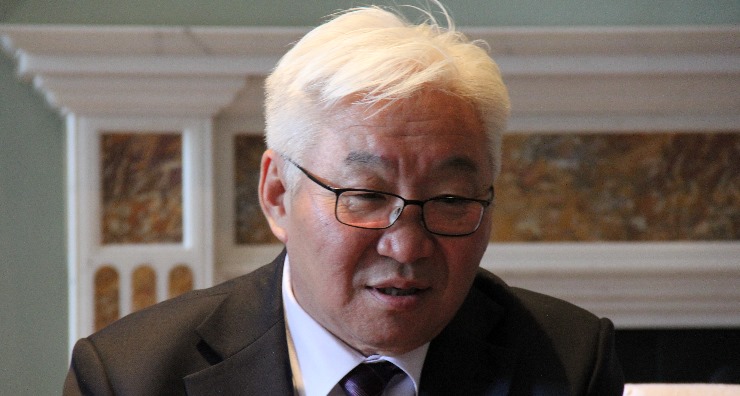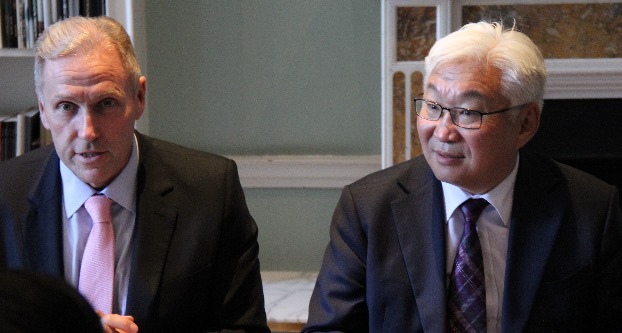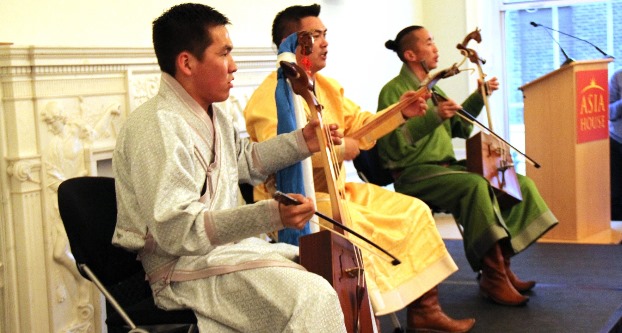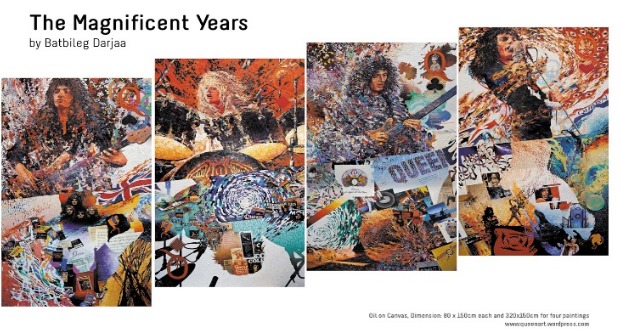Driving commercial and political engagement between Asia, the Middle East and Europe
Driving commercial and political engagement between Asia, the Middle East and Europe
Driving commercial and political engagement between Asia, the Middle East and Europe

It was the free-spirited counterculture evoked in the rock music of the 1960s and 1970s – by the likes of the Rolling Stones, Beatles and Queen – that inspired Bat-Uul Erdene and other Mongolians to fight against the communist regime that had prevailed since 1924 and create democratic present-day Mongolia.
Bat-Uul-Erdene, now the Mayor of Ulaanbaatar, was one of the main organisers of the Democratic Revolution 1990, which overthrew the Mongolian People’s Republic.
Speaking through an interpreter during an interview at Asia House on 26 September, the 57-year-old professional revolutionary, who was on his sixth visit to the UK, said: “That [British rock] music motivated me to participate in democratic change and revolution. When I was 18, Mongolia was a socialist regime and the Government then did not let us listen to Western music and I wondered why we were not allowed to do it. The current Mongolian Ambassador to Russia was imprisoned for some time for listening to Western music,” he said.
“I really want to meet Paul McCartney and Mick Jagger whenever I come here [to the UK],” he added. “I want to thank Paul McCartney and Ringo Starr for making the contribution that they did. We lived by their music and we used their music to fight against the Communist regime,” he said.
“We are very grateful to the British because you were the first country in the world to accept Mongolia’s declaration of independence,” he added.
The Ulaanbaatar Mayor was in London to participate in a business forum, having been invited to do so by Lord Mayor of London Fiona Woolf. While in London he managed to meet the Mayor of London Boris Johnson and Foreign Office Minister Hugo Swire. “My objectives were achieved,” he said. “I met with both Mayors and we discussed some issues and we have agreed to incorporate them in the future,” he said. “Everything was achieved. There are many well-known British companies that already conduct operations in Mongolia and they include Rio Tinto, Deloitte, and Clyde & Co and I met them all here in London and we agreed to cooperate in the future,” he said.
Financial companies and international law firms welcome in Mongolia
When asked which sectors the Ulaanbaatar city authorities wished to attract British companies from, he said “I want to attract British companies from all sectors. The economy of Mongolia depends on the mining sector so financial companies and international law firms would be most welcome,” he added.
He then spoke about plans to improve the infrastructure of the capital, which houses half of Mongolia’s 2.9 million population. Despite admitting he had never stepped foot on the London Underground, Bal-Uul Erdene said there were plans to construct a subway in Ulaanbaatar to connect the West and East of the city. “This talk is going on with the Japanese Government,” he said. “We are also working with the Asian Development Bank to connect the North of Ulaanbaatar with the South by bus rapid transit. I talked to Boris Johnson about eco-friendly buses and whether London could share information about fire and disaster management as London has a very good system. We have also asked for help in the tourism sector as we want to train our people in tourism and Boris Johnson agreed to help with all,” he said.
According to the Asian Development Bank, economic growth in Mongolia slowed to 5.3 per cent in the first half of 2014, despite a double digit growth forecast a few years ago, with delays in mining projects being cited as one of the reasons. Inflation has soared to 13.5 per cent. The Central Bank of Mongolia recently reported a 61 percent decline of foreign direct investment to Mongolia this year already, on top of huge falls last year. Foreign direct investment declined to US$2.294 billion in 2013 compared to $4.407 billion in 2012.
But the GDP growth rate of Ulaanbaatar is currently soaring at 33.8 per cent. Bat-Uul Erdene put that down to the construction sector which he said was developing very rapidly and influencing growth. The country’s overall growth was dependent on the mining sector, he added.
Copper, gold and coal are the main commodities that Mongolia exports. The Oyu Tolgoi (copper and gold mine) and Tavan Tolgoi (coal) project have until recently made the country very attractive to foreign investors. However both projects this year suffered delays and setbacks owing to disputes between government-owned partners and foreign contractors.
By the time it reaches full production in 2021, Oyu Tolgoi is expected to generate up to a third of Mongolia’s GDP. Rio Tinto is working on the mine with the Mongolian government, which has a 34 per cent stake in it.
“The rest of Mongolia is not growing as fast as Ulaanbaatar,” Bat-Uul Erdene said. “The government is interested in developing the rest of the country and other cities and provinces but I don’t think this can be reached very easily. Half the population of Mongolia live in Ulaanbaatar, 80 per cent of savings are there. No other city can compete with Ulaanbaatar in the future.”
Bat-Uul-Erdene was elected to the Mongolian Parliament three times, representing the ruling Democratic Party. However he did not run in the 2012 parliamentary elections, instead running for Mayor of the capital.
Speaking about infrastructure development in the whole country, he said that Chinese President Xi Jinping met with Russian President Vladimir Putin and Mongolia’s President Tsakhiagiin Elbegdorj in Dushanbe, capital of Tajikistan, earlier this month when the joint creation of an economic corridor linking China, Mongolia and Russia was discussed.
“The President of Russia visited Mongolia recently and he said that rail transport cargo would reach 20 million tonnes by 2020.” Plans being developed to increase rail capacity and improve railroads for freight travel from China to Europe and Europe to China through Mongolia. “We have the Trans-Mongolian Railway. We now want to build the next one to go through Mongolia to China,” he added.
There are also talks that a US$ 400 billion gas pipeline contract between Gazprom and China National Petroleum Corporation, signed earlier this year, that will enable Russia to deliver 38 billion cubic metres of gas a year to China, may also run through Mongolia, after Mr Elbegdorj suggested the idea, he said.
Resource-rich Mongolia’s shale oil and gas are also currently being explored by American companies, he said. According to its website, US firm Genie Mongolia is exploring and evaluating oil shale resources in Central Mongolia pursuant to a five year exclusive agreement with the Petroleum Authority of Mongolia.
Before the interview, Bat-Uul Erdene, gave a private briefing exclusively for Asia House corporate members, followed by a roundtable discussion under the Chatham House Rule. He was accompanied by HE Tulga Narkhuu, Ambassador of Mongolia to the UK.
Corporates that were represented included Shell, BP, BG Group, G3, Blue Rubicon and Balli Holdings.

CEO of Asia House Michael Lawrence, left, with the Mayor of Ulaanbaatar Bat-Uul Erdene, right
In that briefing Bat-Uul Erdene spoke about how the population of the capital of Mongolia was fast growing, plans to improve infrastructure and public transport and build new homes in the city, how the projects were being financed, opportunities for western businesses and the challenges that the Mongolian government faced.

Nomadic Expression, the UK’s only traditional Mongolian band, performed at Asia House
Speaking ahead of a performance by the UK’s only traditional Mongolian band, he said: “People say it’s rainy and cloudy in London but whenever I come it is sunny!”
He then went on to talk about meeting a British man on a motorbiking trip around Mongolia.
“He said to me: ‘You can feel freedom in Mongolia, you can sleep anywhere’. This is also a side to my country. Our traditional music contains this freedom too,” he added.
naomi.canton@asiahouse.co.uk
A painting dedicated to British rock band Queen titled The Magnificent Years by the Mongolian artist Batbileg Darjaa was displayed at the Asia House Gallery last month as part of the exhibition Steppe Closer. The same painting had been hosted at the Dominion Theatre in the West End since 2011 to coincide with the musical We Will Rock You. For more details click here.

